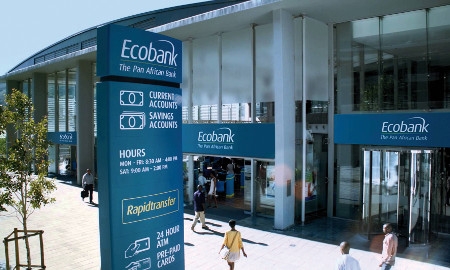Ecobank’s growth since in its inception in 1985 has truly been phenomenal. It is now the leading pan-African bank with operations in 33 countries. Of course, being the pan-African regional leader was something its ambitious founders had envisioned since the bank’s humble beginnings in Togo almost 30 years ago with capital of a mere £20 million.
“Historically, the bank had an ambition to become a regional bank. It was not an afterthought – it started off originally like that, because we felt that there was room for a regional bank to interconnect West Africa,” says Ecobank Nigeria’s Managing Director, Jibril Aku.
That was the founding fathers’ dream – to start a regional bank that could begin to promote trade amongst West African countries. We have dominated 15 countries in West Africa and then we moved into Eastern and Central Africa, eventually becoming the pan-African bank we are today.”
With Nigeria being the regional financial hub, Ecobank’s recent successes can mainly be attributed to its operations in the country. Ecobank Nigeria now accounts for 42 per cent of the Ecobank Group’s total revenue. It is the epicentre of the bank’s operations and is the focal point for foreign investors in Africa, according to Mr Aku.
“South Africa has a more developed financial market, which has been around for much longer, and they have more capitalised banks. But in terms of the population and the market, Nigeria remains the economy of interest to all global investors.”
Up until 2005, Ecobank Nigeria was essentially a private corporate bank operating in a niche market. Around that time it was one of the top 21 banks in the country. That year marked the first great change in the banking sector of Nigeria (the second followed the crisis of 2008). An oversaturated market with over 90 banks led to the Central Bank of Nigeria’s (CBN) decision to increase the capital requirements, which led to numerous consolidations and a much leaner banking sector.
“We have dominated 15 countries in West Africa and then we moved into Eastern and Central Africa, eventually becoming the pan-African bank we are today”
Jibril Aku,
Managing Director of Ecobank Nigeria |
“CBN’s first consolidation in 2005 reduced the number [of banks] to 25. Many banks either merged or they did not make the hurdle,” Mr Aku recalls.
The hurdles did not prove to be too high for Ecobank Nigeria, and the consolidations of 2005 turned out to be a great opportunity for it to expand and diversify its operations.
“After the 2005 consolidation, it emerged as a very small and over-capitalised bank. So the strategy was developed to grow fast into a fully fledged universal bank, and then we ramped up on retail banking growth. The first thing we did was start an acquisition drive, with some of the banks that had failed the consolidation process in 2005. To date, we have made four acquisitions.”
The strategy paid off as Ecobank has moved from the ranks of the top 21 to the top six banks in the market, challenging some of the big international banks. And Mr Aku is very confident they can improve on that position: “Today we are one of the top six banks with a good chance to fight for the top three in Nigeria; this is our current strategic goal.”
The most recent of Ecobank’s acquisitions was in late 2011, when it took over defunct Oceanic Bank International – one of the victims of the financial crash of 2008/09 that hit Nigeria hard. This latest merger has given Ecobank an even stronger foothold in the market and puts it in a prime position to take on the big three. Through Oceanic, it has acquired an additional 4.5 million customers, around N500 billion (£2 billion) in deposits and has gained a competitive edge in the retail banking market.
Ecobank’s huge financial gains last year were mainly thanks to this acquisition. Profit before tax grew 65 per cent, while revenue increased 106 per cent. As the bank stabilises and fully integrates following the merger, the bank’s chief executive believes that it will have “a much bigger platform to be able to generate more revenue and business for our shareholders.”
As the leading pan-African bank, Ecobank is also leading the way in offering the latest IT services, be it for its business or individual customers. In 2012 for example, the bank entered an agreement with MoneyGram, which will give the diaspora the chance to make hitch-free money transfers.
It also launched Ecobank Mobile Money, promoting Nigeria’s cashless policy and financial inclusion for the unbanked, particularly in rural areas. Those even without a bank account will now be able to make simple financial transactions through their mobile phones.
“In terms of product innovation and the IT platform for collections and payments, we are strengthening our existing platforms,” says Mr Aku. “We are looking at differentiating our trade products, because we are not restricted to just one country. So we bring in different features to make the products more attractive no matter the market.”
So why should foreign investors look to partner with Ecobank? Mr Aku states that Ecobank offers a unique entry point into Africa and unrivalled expertise in the markets of the 33 African countries in which it operates, as well as its vital support and counsel which are grounded in almost 30 years of experience of the African business environment.
He adds: “We always tell investors that we are like a single entry into Africa, particularly Nigeria. We can guide you through that process to make you hit the ground running faster than you would if you went through another bank.”

0 COMMENTS